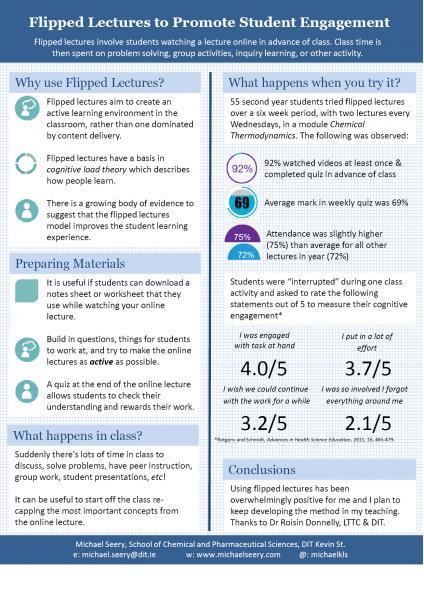As with most new blogs, I’ll begin with: “Hello world!” I’m delighted to be a contributor to the new Education in Chemistry blog and I’m looking forward to sharing ideas and hearing back from the chemistry education community
My own interests are based around the use technology in education and school to university transition, so I suppose that’s what I hope to share on this blog. I have a tendency to go on a bit, so I am imposing a restriction to my posts of 600 words, which is about the length of a cup of tea. There’s 97 so far; go on, have that biscuit.

Over the last while I’ve been looking into 'flipped' lectures. The flipped lecture concept is gaining a lot of attention in the last few years, although I would guess that it is still in the early adopter phase. This modern iteration began in a chemistry classroom, where two US chemistry teachers thought about using videos to present some chemistry material in advance of class, and then used the class time to work through problems and difficulties. They wrote a book on the topic, which is an enthusiastic description of their implementation. Our very own EiC featured an article on flipped lectures recently.
People will say they’ve been flipping lectures for years, which of course is true. I can point you to a 1985 Journal of Chemical Education paper on pre-lecture reading. I suppose what the more recent innovation brings is the use of technology to make it all a bit more seamless. Videos go online that students watch before class. You might include a quiz that students do before class, that will automagically correct itself, give students feedback and you an idea of difficulties students were having. In my implementation, I also used the quiz to ask students to identify what concept they found difficult, and was quite impressed with their ability to pinpoint areas causing confusion.
Suddenly you have a lot of time free in class. What do you do? The literature on flipped lectures has been a bit sparse until recently, but 2013 saw several papers on the topic. It was interesting to see what people did in this free time. Some (like myself) worked on problems based on the pre-lecture material. Others used peer-discussion and structured peer-activities, for example inquiry activities, often augmented with clickers. One interesting paper included student presentations in their class time. I suppose the message is: there are lots of options.
What of my own implementation? I was worried that students wouldn’t watch the online videos. 92% of students did. I was worried they wouldn’t come to class. The average attendance at my lectures was higher than other classes (and this includes my Wednesday 9 am!). Students told me they liked having the quiz to check in on their understanding each week, and there was a good work ethic in my lecture rooms with students working through problems together. In my implementation, I didn’t announce it as a big change in my first lecture; I just presented it as the way things were happening. I think that’s important. The poster shows some more details of my implementation.
So over to you, dear reader! I’m interested in hearing opinions on the concept of flipped classrooms. Have you tried it out? Would you like to? Does chemistry offer any challenges that other subjects mightn’t have to consider? I’m interested to hear your views. I’m more positive about the idea of flipped classes than I was before my trial, but I think I’m still only beginning the journey. Another biscuit?









No comments yet